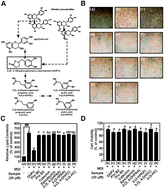5-(3′,4′-Dihydroxyphenyl)-γ-valerolactone, a metabolite of procyanidins in cacao, suppresses MDI-induced adipogenesis by regulating cell cycle progression through direct inhibition of CDK2/cyclin O†
Abstract
Cacao (Theobroma cacao) has a significant polyphenol content and has been reported to elicit anti-obesity effects. Previous studies have focused on the properties of cacao extract and procyanidins, while the potential mechanisms have not been fully elucidated. Here, we investigated the inhibitory effects of procyanidin metabolites on adipogenic cocktail-induced adipogenesis and lipogenesis in 3T3-L1 preadipocytes. It was observed that 5-(3′,4′-dihydroxyphenyl)-γ-valerolactone (DHPV), a major procyanidin metabolite, exhibited the greatest inhibitory effects on adipogenesis and lipogenesis. DHPV dose-dependently reduced the expression levels of proteins involved in adipogenesis including peroxisome proliferator-activated receptor γ (PPAR γ) and CCAT/enhancer-binding protein α (C/EBP α), as well as lipogenesis-related factors such as fatty acid synthase and acetyl-CoA carboxylase. These inhibitory effects were primarily due to G1 phase arrest and the suppression of cell proliferation during mitotic clonal expansion, the early stage of adipogenesis. In an extensive kinase array, DHPV directly suppressed activation of the CDK2/cyclin O complex, and inhibited the phosphorylation of C/EBP β, which is responsible for the induction of PPAR γ and C/EBP α. Taken together, these findings suggest that DHPV is a highly biologically active compound with potential anti-obesity effects and works by inhibiting the intracellular lipid content and cell differentiation.



 Please wait while we load your content...
Please wait while we load your content...